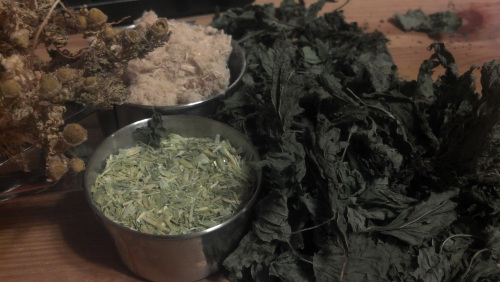How to Make Your Own Herbal Syrup
 Dried herbs begin losing their potency anywhere from six months to a year after storage, and exposure to sunlight accelerates their decline. I thought about that as I looked through my herbal pantry today at the unused stash of wildcrafted stinging nettle, pineapple weed (wild chamomile), lemon balm, and pine needles. And at my store-bought jars of slippery elm bark and oatstraw. I considered how it good it would be to take all of these herbs regularly.
Dried herbs begin losing their potency anywhere from six months to a year after storage, and exposure to sunlight accelerates their decline. I thought about that as I looked through my herbal pantry today at the unused stash of wildcrafted stinging nettle, pineapple weed (wild chamomile), lemon balm, and pine needles. And at my store-bought jars of slippery elm bark and oatstraw. I considered how it good it would be to take all of these herbs regularly.
Lately I’ve been fraught with digestive troubles and adrenal fatigue, which I recognize as the result of working too hard and taking on too much stress in a life-long, chronic sort of way. I have since changed my lifestyle, and under the guidance of my naturopathic physician, even radically changed my diet. (My vegetarianism is on hiatus after 14 successful years, which after developing an intolerance to soy and trouble digesting beans, has been exchanged for an experiment in conscious pseudo-paleo omnivorism). And yet my stomach troubles and fried nerves remain.
Fortunately, these herbs will support my recovery tremendously. Consider these incredible benefits:
Oatstraw via Wikipedia
* Stinging nettle: Contains fatty acids and protein, B vitamins, and many minerals, especially magnesium, calcium, and iron. Nourishing for the entire body and considered a “tonic,” an herb to strengthen, the adrenal system.* Oatstraw: Strengthens nervous system and is especially useful for exhaustion and depression. Rich in calcium.
* Wild chamomile: Calms the nervous system and relieves indigestion and inflammation in the stomach.
* Slippery elm: Nourishes and soothes inflamed mucus membranes in the digestive system.
* Lemon balm: Relieves tension, anxiety and depression, and relieves gas and spasms in digestive tract.
I could prepare these herbs in various ways. I thought about drinking lots of tea. But that would be a lot of tea, and a lot of time spent mixing the herbs together into a tea ball and then washing said tea ball. Then I thought about turning the herbs into a tincture, an alcohol extract. But the tincture recipe for dried herbs is 1 part herb to 5 parts solvent, which would get expensive in terms of alcohol. It’s also not the most pleasant-tasting way to take herbs on an ongoing basis. So then I had a better idea: Herbal syrup!
 If you make a strong decoction and reduce it, and then add in some glycerin and honey, you are left with an herbal syrup that lasts for up to a year in the fridge. And it tastes much sweeter and therefore more palatable than plain tea, too. You can then enjoy it straight or add it to a flavorful herbal tea as a sweetener.
If you make a strong decoction and reduce it, and then add in some glycerin and honey, you are left with an herbal syrup that lasts for up to a year in the fridge. And it tastes much sweeter and therefore more palatable than plain tea, too. You can then enjoy it straight or add it to a flavorful herbal tea as a sweetener.
The recipe for making an herbal syrup is very easy:
1) Gather together whatever herbs you would like, using the ratio of 1 cup of dried herbs per 1 pint of water. Bring them to a boil. If you can use a glass pot, that is ideal, because metal can interact with herbs and alter their chemistry. But use whatever you have.
2) Simmer until the water level is reduced to one-half or even down to one-quarter of what it was. This is your herbal concentrate.
3) Let it cool, and then strain the herbs out. You could use a coffee filter or a mesh screen or a handkerchief. Squeeze the herbs to get any last bits of medicine extracted in the water.
4) Add 8 tablespoons each of honey and vegetable glycerin per quart of herbal concentrate. Stir it in. Refrigerate it. Voila!
Warning: This recipe is incredibly delicious.
Suggested dose: 1 to 2 tbsp per day.
***
Learn to make herbal medicines with me at my upcoming Herbal Medicine 101 class 2 p.m. to 5 p.m. on Sunday, March 10, at HARP, 1611 SE Bybee Blvd., Portland. $40, including medicine to take home. Space is limited and advance registration is required here.
Share this post!











